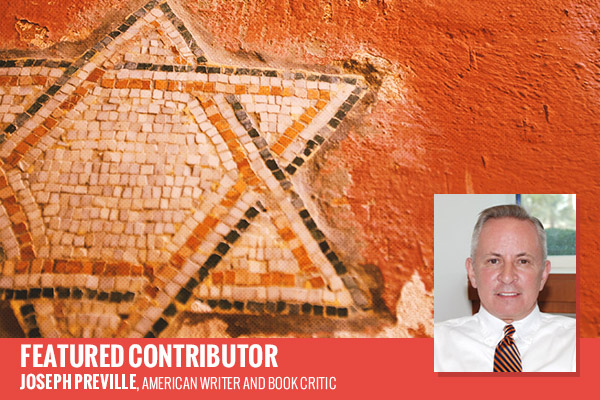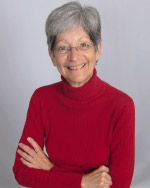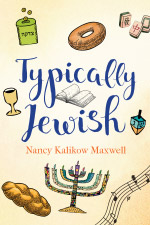
The Core Elements of Jewish Identity: An Interview with ‘Typically Jewish’ Author Nancy Kalikow Maxwell
- By Joseph Preville --
- 08 May 2019 --

Jews have historically stood somewhat apart from others, while at the same time being part of the community.
What does it feel like to be Jewish? And, what are the core elements of Jewish identity? Nancy Kalikow Maxwell offers engaging answers to these questions in her new book, Typically Jewish (The Jewish Publication Society, March 2019). Maxwell looks at what she considers “quintessential Jewish qualities—questioning, arguing, laughing, caring, and worrying—while still enjoying life to its fullest.” Typically Jewish is a wise and witty cornucopia of Jewish likes and dislikes, customs, humor, and tribal tastes and treasures. Over the centuries and across the globe, Jews have built a vast library of books devoted to every imaginable topic of concern and interest to the Jewish people. Typically Jewish is a charming addition to that large and inclusive library.
Nancy Kalikow Maxwell discusses her new book in this interview.
The Core Elements of Jewish Identity: An Interview with ‘Typically Jewish’ Author Nancy Kalikow Maxwell[/tweetthis]
Joseph Richard Preville: What was the inspiration for your new book?

JRP: Who are your Jewish heroes and favorite Jewish authors?
NKM: I can’t believe you asked that because at this very moment I am working on my next book that will address both of those questions. I have so far identified three top Jewish heroes (heroines, actually) who, as it turns out, all have names beginning with the letter “B.” There’s Betty Kalikow, my mother, who with only a high school education established the premier Jewish catering company in Kansas City; Barbra Streisand, who was idolized by Jewish girls my age for refusing to get her nose fixed; and the Biblical figures Shiphrah and Puah, (I know, their names don’t start with B, but I’m pulling my poetic license). Those two courageous midwives refused to carry out Pharaoh’s orders to kill newborn Hebrew boys. Talk about chutzpah.
As for my favorite authors, as a librarian I respectfully demur from providing any answer. For someone in my profession, that’s like asking a mother to pick her favorite child. Let’s just say that two books that greatly affected me and my sex life were Herman Wouk’s Marjorie Morningstar and Erica Jong’s Fear of Flying. To find out how, you’ll need to read my next book.
JRP: What are the threads that have linked Jews through the centuries?
NKM: “Jews are just like everybody else, only more so,” is a familiar saying that hints at my answer. Throughout our long history (We’re in the year 5779 by our calendar), Jews have perennially constituted a tiny minority surrounded by a dominate, majority population. One of the threads connecting Jews through the centuries is how they managed to simultaneously live together, yet remain apart from others. (A crazy combination, no?) Somehow Jews have been able to perform that delicate dance by maintaining some form of uniqueness and distinctiveness, while assimilating into the surrounding culture. Unfortunately, that insistence on separateness has also resulted in another tragic thread of Jewish history—persecution and expulsion–which all too often happen when the majority population turns upon this distinct group, blaming them for whatever ills have befallen the community.
JRP: How would you define Jewish identity?
 NKM: I wholeheartedly agree with the definition of Jewish identity put forth by playwright Daniel Goldfarb: “If you are in the process of trying to figure out what it means to be Jewish, then you’re Jewish.” One conclusion in my book is that Jewish identity can’t easily be defined. Rather, it’s an amalgamation of millions of little things that are different for each Jew. I developed a 30-page curriculum to encourage Jews to attempt to answer that question as a group. And trust me. Jews love talking about this topic. The discussions about Jewish identity held with what I called my “Jury on Jewishness,” (a cadre of friends I roped into talking Jewish identity), often lasted several hours. The next day my email would be filled with comments continuing the conversation. Warning: once Jews start talking about this, they may not stop.
NKM: I wholeheartedly agree with the definition of Jewish identity put forth by playwright Daniel Goldfarb: “If you are in the process of trying to figure out what it means to be Jewish, then you’re Jewish.” One conclusion in my book is that Jewish identity can’t easily be defined. Rather, it’s an amalgamation of millions of little things that are different for each Jew. I developed a 30-page curriculum to encourage Jews to attempt to answer that question as a group. And trust me. Jews love talking about this topic. The discussions about Jewish identity held with what I called my “Jury on Jewishness,” (a cadre of friends I roped into talking Jewish identity), often lasted several hours. The next day my email would be filled with comments continuing the conversation. Warning: once Jews start talking about this, they may not stop.
JRP: What is the difference between “Jews by birth” and “Jews by choice”?
NKM: Here’s my best Talmudic answer: there is a tremendous difference and there is no difference whatsoever between those born Jewish and those joining “the tribe” later in life. It all depends on the person. For instance, I was astonished to learn that one of the “machers” (big deals) of my synagogue was not born Jewish. In every respect, he seemed “typically Jewish” to me. On the other hand, some people are born into a Jewish family but experience little connection with their religion.
As an aside, I was once told that converts shouldn’t be called “Jews by choice” because all Jews fit that description. Since Judaism demands 613 commandments, no one can fulfill them all so we are constantly choosing to be Jews by deciding which to observe or ignore.
JRP: What is the Jewish concept of tikkun olam? How important is it in Jewish social action?
NKM: Tikkun olam is the commandment to repair or heal the world. Many Jewish religious leaders began emphasizing the concept in the 1980s by pointing out how our religion favors acts over thoughts. For instance, Rabbi Harold S. Kushner has noted the seven deadly sins (lust, gluttony, greed, sloth, anger, pride or envy) are not especially egregious because “they all happen inside a person, not between one person and another.” Instead, social issues impacting the real world are important to Jews. Many Jews now see participating in Jewish and secular causes, ranging from environmentalism, to political activity to organizational work, as the essence of their religious expression. Jewish Theological Seminary Professor Jack Wertheimer even sees that tikkun olam can serve as a “surrogate religion” for some Jews in his new book, The New American Judaism (Princeton University Press, 2018).
JRP: What is distinctive about Jewish humor?
NKM: What, you think that’s a funny question? I’ll give you funny…
In truth, if I knew the answer to that one, I would be a stand-up comedian instead of a writer. (I hear they are paid better.) Since I’m not, I’ll just say that what I find particularly distinctive about Jewish humor is its “edginess.” As I mentioned in a previous question, Jews have historically stood somewhat apart from others, while at the same time being part of the community. This perpetual in-but-out status gives Jews the ability to see inconsistencies and hypocrisies that those immersed in the dominate culture may miss. Judaism also encourages Jews to speak up. As comedian Colin Quinn noted, “The worst thing you can say to a Jew is ‘I don’t want to talk about it.’” The result is often social action, or a good joke, or both.
JRP: Where and when do you think American Jews feel the most connected to their faith and community?
NKM: American Jews feel most Jewish sitting in a booth at a Jewish deli eating an overstuffed pastrami on rye. Typically Jewish has an entire chapter on Jews and food because I believe Jews have a more intimate relationship with food than other ethnic/religious groups. Central to every Jewish celebration is the communal sharing of food. Even our major fast day, Yom Kippur, now concludes with a break-the-fast gathering. In addition to eating in restaurants, Jews feel connected to their religion at home, where many major holidays are celebrated. Since many of these holidays require ritual items, such as candlesticks, wine goblets, etc., Jewish homes also contain objects that connect Jews with their tradition. And finally, Jews experience a connection with their community when listening to a lecture at the Jewish Community Center or attending a Bar Mitzvah in a synagogue. But, I guarantee you, both activities will also be accompanied with food.
JRP: How does the Jewish future rest on adaptation and imagination?
NKM: I love how you phrased that question. In order to remain relevant, all religions—including Judaism—must adapt to changing times. However, any alterations that go too far can rob the religion of the powerful feeling of historical continuity. As your question infers, imagination is required for a religion to change, but still feel the same. For instance, in the 1970s feminists wanted to create a welcoming ceremony for baby girls to parallel the bris (circumcision) for boys. Originally, they suggested a ritual foot washing or immersing the baby in water, but the practice didn’t feel authentic. Instead, they created a ceremony culminating with the pronouncement of the baby’s name, which worked because Jews have a historical identification with their names. But it took plenty of imagination—and trial and error—to find the workable adaption, which is essentially a blueprint for Judaism’s future.



















